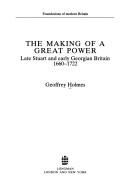| Listing 1 - 9 of 9 |
Sort by
|
Book
Year: 1927 Publisher: London : J. Murray,
Abstract | Keywords | Export | Availability | Bookmark
 Loading...
Loading...Choose an application
- Reference Manager
- EndNote
- RefWorks (Direct export to RefWorks)
George --- Great Britain --- History --- George I, 1714-1727
Digital
Year: 1717 Publisher: London Printed for John Philips, and sold by J. Brotherton and P. Meadows ... and J. Roberts ...
Abstract | Keywords | Export | Availability | Bookmark
 Loading...
Loading...Choose an application
- Reference Manager
- EndNote
- RefWorks (Direct export to RefWorks)
Digital
Year: 1717 Publisher: London Printed for John Phillips, and sold by J. Brotherton and P. Meadows ... and J. Roberts ...
Abstract | Keywords | Export | Availability | Bookmark
 Loading...
Loading...Choose an application
- Reference Manager
- EndNote
- RefWorks (Direct export to RefWorks)
Book
ISBN: 1804365513 Year: 2024 Publisher: London : Canelo Digital Publishing Ltd,
Abstract | Keywords | Export | Availability | Bookmark
 Loading...
Loading...Choose an application
- Reference Manager
- EndNote
- RefWorks (Direct export to RefWorks)
Thief Jonas Flynt follows the trail of a missing lawyer to a quiet village in the north of England, but dark forces are at play, and an assassin stalks him.
Digital
Year: 1720 Publisher: London Printed for E. Curll ...
Abstract | Keywords | Export | Availability | Bookmark
 Loading...
Loading...Choose an application
- Reference Manager
- EndNote
- RefWorks (Direct export to RefWorks)

ISBN: 0582484391 0582484383 9780582484399 9780582484382 Year: 1993 Publisher: London: New York: Longman,
Abstract | Keywords | Export | Availability | Bookmark
 Loading...
Loading...Choose an application
- Reference Manager
- EndNote
- RefWorks (Direct export to RefWorks)
Grande-Bretagne --- --1660-1722 --- --Great Britain --- Great Britain --- History --- Great Britain - History - 1660-1714 --- Great Britain - History - George I, 1714-1727
Book
ISBN: 050025060X 9780500250600 Year: 1978 Publisher: London: Thames and Hudson,
Abstract | Keywords | Export | Availability | Bookmark
 Loading...
Loading...Choose an application
- Reference Manager
- EndNote
- RefWorks (Direct export to RefWorks)
George I, founder of the Hanoverian dynasty in Great Britain, has long been a shadowy and enigmatic historical figure. Professor Hatton, with access to much material hitherto unavailable, has been able to clear away the myths and legends which anti-Hanoverian propaganda created about him and to answer many of the questions posed by his career. George - favoured son of fond but ambitious parents - faced two significant crises as a young man : dynastic struggle within his immediate family isolated him from all but one of his brothers ; and the ill-fated love affair of his wife, Sophia Dorothea, with the Swedish count Königsmarck, resulted not only in scandal and Königsmarck's mysterious death, but long-lasting emotional and political complications. But during these years he benefited from the tutelage of an astute father, an uncle who closely co-operated with the British king, William III, and a loving and intellectual mother. Through his maternal grandmother, the "Winter Queen" Elizabeth of Bohemia - daughter of James I - accession to the British throne was a possibility, and one for which he schemed and planned. George welcomed the power which the strength of Great Britain gave him after he succeeded Queen Anne in 1714, and he used it with relish. Hanover was extended ; Britain - "perfidious Albion" - was reconciled to the allies it had deserted in 170-12 ; and George had a major share in the evolution of a congress and interlocking guarantee system to solve European conflicts with minimum recourse to force. George is shown as a typical figure of the Early Enlightenment, and his rationalist ideas were particularly prominent in his ingenious scheme for dissolving the dynastic union which in practice created problems for both Britain and Hanover. His personal life after his divorce in 1694 is also sympathetically described : his enduring relationship with Melusine von der Schulenburg (his mistress from 1691) and their three daughters ; the tensions which arose between himself and the Prince of Wales ; his deep fondness for his only legitimate daughter, who became queen of Prussia ; his solicitude for his grandchildren, legitimate and illegitimate ; his relaxations, his patronage of music, and the improvements he made to both his British and Hanoverian properties.
Digital
Year: 1749 Publisher: London Printed for A. Millar
Abstract | Keywords | Export | Availability | Bookmark
 Loading...
Loading...Choose an application
- Reference Manager
- EndNote
- RefWorks (Direct export to RefWorks)
Bolingbroke, Henry St. John, -- Viscount, -- 1678-1751 -- Idea of a patriot king --- Bolingbroke, Henry St. John, -- Viscount, -- 1678-1751 -- Dissertation upon parties --- Patriotism --- Political parties -- Great Britain --- Great Britain -- History -- George I, 1714-1727 --- Kings and rulers -- Duties --- Great Britain -- Politics and government -- 1714-1760
Digital
Year: 1718 Publisher: London Printed by J. Peters ...
Abstract | Keywords | Export | Availability | Bookmark
 Loading...
Loading...Choose an application
- Reference Manager
- EndNote
- RefWorks (Direct export to RefWorks)
Tindal, Matthew, -- 1653?-1733 -- Defection consider'd and the designs of those who divided the friends of the government set in a true light --- Walpole, Robert, -- Earl of Orford, -- 1676-1745 --- Great Britain -- Politics and government -- 1714-1727 --- Great Britain -- History -- George I, 1714-1727
| Listing 1 - 9 of 9 |
Sort by
|

 Search
Search Feedback
Feedback About UniCat
About UniCat  Help
Help News
News